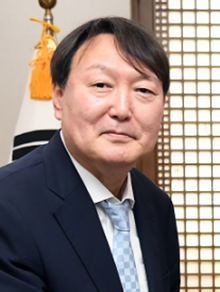South Korean president impeached by nation's parliament
| |
This article requires pre-publication review by an uninvolved reviewer (one not substantially involved in writing the article). Note, only qualified reviewers may do this and publish articles. This right requires experience with Wikinews policies and procedures. To request the right, apply here.
Reviewers, please use Easy Peer Review per these instructions.
|
| This article requires pre-publication review by an uninvolved reviewer (one not substantially involved in writing the article).
Note, only qualified reviewers may do this and publish articles. This right requires experience with Wikinews policies and procedures. To request the right, apply here.
Reviewers, please use Easy Peer Review per these instructions. -Article last amended: Dec 14 at 22:33:13 UTC (history) Please check the talk page history before reviewing. |
Saturday, December 14, 2024

Image: 대한민국 국회.

Image: 대한민국 대법원.
On Saturday, the 300-member National Assembly of the Republic of Korea voted 204 to 85 to impeach South Korean president Yoon Suk Yeol.
The vote was the result of Yoon declaring and lifting martial law following months of political adversity, which he justified under the pretense of preserving democracy in the country.
The motion came after a previous unsuccessful attempt to impeach Yoon last week, which failed after members of the People Power Party (Yoon's ruling party) staged a walkout, and refused to attend the hearing. In this instance, People Power Party allowed its members to make their own decison in the vote. Twelve party members voted in favor of impeachment, and another 85 voted in opposition to the motion.
Consequently, Yoon was suspended from office, and South Korean Prime Minister Han Duck-soo was designated as the nation's acting president. Han has stated that his goal was to restore "normalcy" to the people of South Korea.
Han and South Korean finance minister Choi Sang-mok were both involved in a police probe pertaining to Yoon. Yoon became the first South Korean president to be banned from leaving the country, which was the result of an investigation into intentions of insurrection.
Democratic Party leader Lee Jae-myung lauded the desision and said "the people are owners of this country."
Yoon himself expressed his view that the vote was but a minor setback in his presidency, vowing to "never give up", BBC reported. He was quoted saying, "I will take your criticism, praise, and support to the heart and do my best for the country until the end."
The decision still required ratification by the Constitutional Court of Korea, which has 180 days to make a decision, BBC reported. If the court votes to remove Yoon from office, an election to replace him must be held within 60 days.
Constitutional Court Acting Chief Justice Moon Hyung-bae affirmed that the trial would be "speedy and fair."
The motion was met with celebratory fireworks and song outside the National Assembly from thousands of dissenters, in the "bitter cold", BBC reported. NPR reported that many were seen waving light sticks often seen at K-pop concerts.
Polling data suggested that three-quarters of South Koreans supported the removal of Yoon from office.
While serving as prosecuter, Yoon himself personally oversaw the investigation that resulted in the impeachment of former South Korean president Park Geun-hye in 2016.
Sources
edit- Kelly Ng. "South Korea parliament votes to impeach president" — BBC, December 14, 2024
- Anthony Kuhn. "South Korea's parliament votes to impeach President Yoon Suk Yeol" — NPR, December 14, 2024

